Kia EV9 vs Peugeot Rifter – Which car suits you better?
Two cars, one duel: Kia EV9 meets Peugeot Rifter.
Which one wins in performance, efficiency and value for money? Find out now!
Costs and Efficiency:
Looking at overall running costs, both models reveal some interesting differences in everyday economy.
Peugeot Rifter has a convincingly advantage in terms of price – it starts at 23800 £, while the Kia EV9 costs 53100 £. That’s a price difference of around 29314 £.
In terms of energy consumption, the advantage goes to the Peugeot Rifter: with 18.30 kWh per 100 km, it’s minimal more efficient than the Kia EV9 with 19.50 kWh. That’s a difference of about 1.20 kWh.
As for range, the Kia EV9 performs clearly perceptible better – achieving up to 563 km, about 224 km more than the Peugeot Rifter.
Engine and Performance:
Under the bonnet, it becomes clear which model is tuned for sportiness and which one takes the lead when you hit the accelerator.
When it comes to engine power, the Kia EV9 has a significantly edge – offering 508 HP compared to 136 HP. That’s roughly 372 HP more horsepower.
In acceleration from 0 to 100 km/h, the Kia EV9 is decisively quicker – completing the sprint in 4.60 s, while the Peugeot Rifter takes 10.80 s. That’s about 6.20 s faster.
In terms of top speed, the Kia EV9 performs somewhat better – reaching 220 km/h, while the Peugeot Rifter tops out at 184 km/h. The difference is around 36 km/h.
There’s also a difference in torque: Kia EV9 pulls convincingly stronger with 740 Nm compared to 300 Nm. That’s about 440 Nm difference.
Space and Everyday Use:
Cabin size, boot volume and payload all play a role in everyday practicality. Here, comfort and flexibility make the difference.
Both vehicles offer seating for 7 people.
In curb weight, Peugeot Rifter is convincingly lighter – 1561 kg compared to 2392 kg. The difference is around 831 kg.
In terms of boot space, the Peugeot Rifter offers significantly more room – 1050 L compared to 333 L. That’s a difference of about 717 L.
In maximum load capacity, the Peugeot Rifter performs clearly perceptible better – up to 3500 L, which is about 1107 L more than the Kia EV9.
When it comes to payload, Peugeot Rifter clearly perceptible takes the win – 814 kg compared to 615 kg. That’s a difference of about 199 kg.
Who comes out on top?
Overall, the Kia EV9 shows itself to be outperforms in nearly all aspects and secures the title of DriveDuel Champion.
It convinces with the more balanced overall package and proves to be the more versatile choice for everyday use.
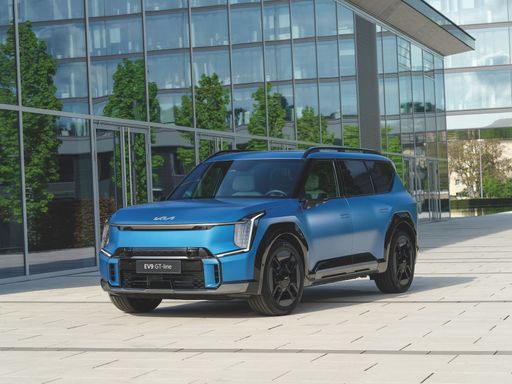
Kia EV9
Kia EV9
The Kia EV9 represents a bold step forward in the automotive world with its distinctive design and futuristic appeal. This all-electric SUV promises to provide a spacious and comfortable cabin experience, making it ideal for families and long journeys. With its emphasis on sustainability and advanced technology, the EV9 aims to redefine the standards for electric vehicles in its category.
details @ press.kia.com
@ press.kia.com
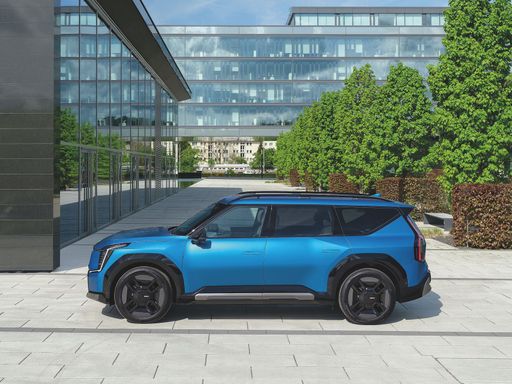 @ press.kia.com
@ press.kia.com
 @ press.kia.com
@ press.kia.com
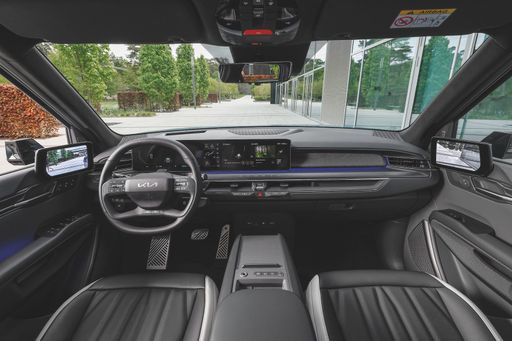 @ press.kia.com
@ press.kia.com
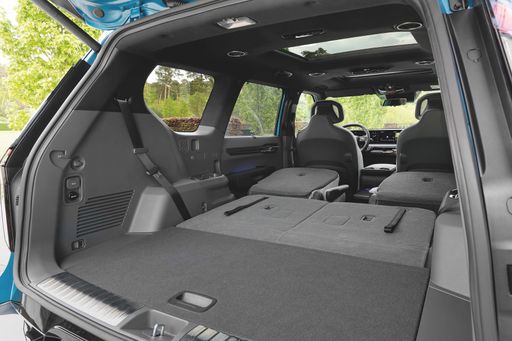 @ press.kia.com
@ press.kia.com
Peugeot Rifter
Der Peugeot Rifter beeindruckt mit seinem robusten Design und seiner hohen Vielseitigkeit, die ihn ideal für Familien und Outdoor-Abenteuer macht. Der Innenraum ist geräumig gestaltet und bietet zahlreiche innovative Technologien, die den Komfort und die Sicherheit der Insassen erhöhen. Zudem überzeugt der Rifter mit seiner hervorragenden Fahrdynamik, die sowohl in der Stadt als auch auf längeren Strecken für ein angenehmes Fahrerlebnis sorgt.
details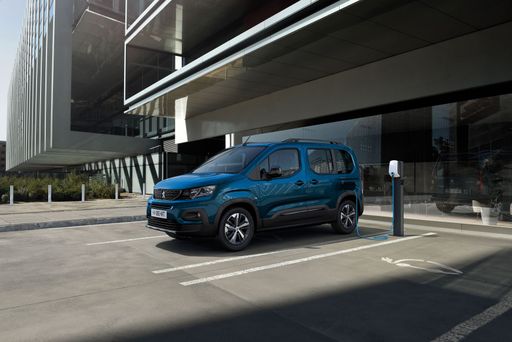 @ media.stellantis.com
@ media.stellantis.com
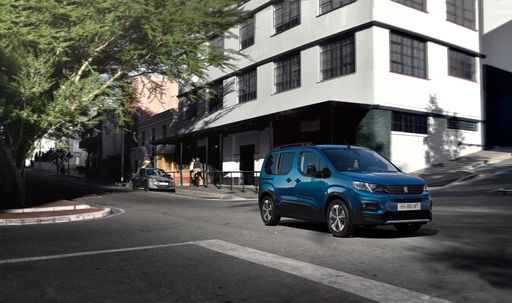 @ media.stellantis.com
@ media.stellantis.com
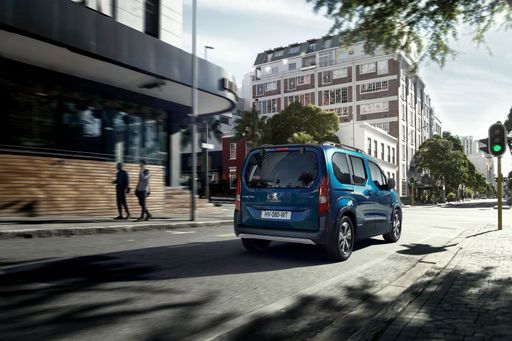 @ media.stellantis.com
@ media.stellantis.com
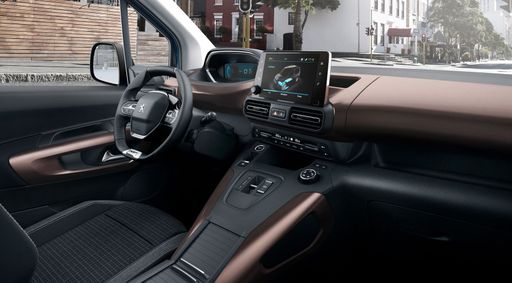 @ media.stellantis.com
@ media.stellantis.com

|

|
|
|
|
Costs and Consumption |
|
|---|---|
|
Price
53100 - 78000 £
|
Price
23800 - 36600 £
|
|
Consumption L/100km
-
|
Consumption L/100km
5.6 - 6 L
|
|
Consumption kWh/100km
19.5 - 22.8 kWh
|
Consumption kWh/100km
18.3 - 19.1 kWh
|
|
Electric Range
443 - 563 km
|
Electric Range
328 - 339 km
|
|
Battery Capacity
76.1 - 99.8 kWh
|
Battery Capacity
-
|
|
co2
0 g/km
|
co2
0 - 158 g/km
|
|
Fuel tank capacity
-
|
Fuel tank capacity
50 L
|
Dimensions and Body |
|
|---|---|
|
Body Type
SUV
|
Body Type
High Roof Estate
|
|
Seats
6 - 7
|
Seats
5 - 7
|
|
Doors
5
|
Doors
4 - 5
|
|
Curb weight
2392 - 2664 kg
|
Curb weight
1561 - 1941 kg
|
|
Trunk capacity
333 L
|
Trunk capacity
322 - 1050 L
|
|
Length
5010 - 5015 mm
|
Length
4405 - 4755 mm
|
|
Width
1980 mm
|
Width
1848 mm
|
|
Height
1755 - 1780 mm
|
Height
1818 - 1837 mm
|
|
Max trunk capacity
2318 - 2393 L
|
Max trunk capacity
3000 - 3500 L
|
|
Payload
542 - 615 kg
|
Payload
489 - 814 kg
|
Engine and Performance |
|
|---|---|
|
Engine Type
Electric
|
Engine Type
Electric, Diesel
|
|
Transmission
Automatic
|
Transmission
Automatic, Manuel
|
|
Transmission Detail
Reduction Gearbox
|
Transmission Detail
Reduction Gearbox, Manual Gearbox, Automatic Gearbox
|
|
Drive Type
All-Wheel Drive, Rear-Wheel Drive
|
Drive Type
Front-Wheel Drive
|
|
Power HP
204 - 508 HP
|
Power HP
102 - 136 HP
|
|
Acceleration 0-100km/h
4.6 - 9.4 s
|
Acceleration 0-100km/h
10.8 - 13.6 s
|
|
Max Speed
185 - 220 km/h
|
Max Speed
132 - 184 km/h
|
|
Torque
350 - 740 Nm
|
Torque
250 - 300 Nm
|
|
Number of Cylinders
-
|
Number of Cylinders
4
|
|
Power kW
150 - 374 kW
|
Power kW
75 - 100 kW
|
|
Engine capacity
-
|
Engine capacity
1499 cm3
|
General |
|
|---|---|
|
Model Year
2023 - 2025
|
Model Year
2024
|
|
CO2 Efficiency Class
A
|
CO2 Efficiency Class
A, E, F
|
|
Brand
Kia
|
Brand
Peugeot
|
Is the Kia EV9 offered with different drivetrains?
The Kia EV9 is offered with All-Wheel Drive or Rear-Wheel Drive.
The prices and data displayed are estimates based on German list prices and may vary by country. This information is not legally binding.
